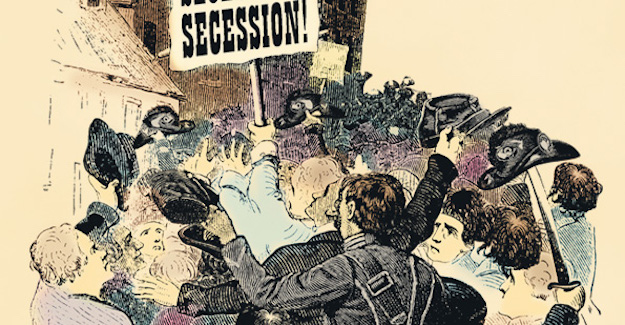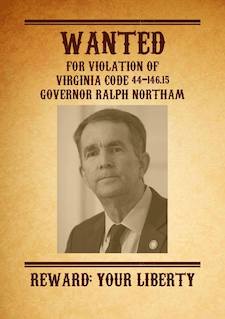
There’s no disputing the void that has been left behind since economist Walter Williams passed away in December. Williams had a remarkable ability to convey free market economic concepts in a way the masses could easily digest. Big shoes to fill indeed.
Walter Williams’s Sympathy toward Secession
One overlooked aspect of Williams’s work was his sympathy for the strategy of secession. It may surprise some of us that an African American could even support such an idea. The commonly touted narrative on secession, after all, is that only supporters of the secessionist old Confederacy would even think about supporting secession today. Attempts to connect secession to racism and slavery are common.

Walter E. Williams, Emeritus Distinguished Professor of Economics, George Mason University.
But if there is one thing that Walter Williams showcased throughout his career, it is that he was no race hustler and never fell for cheap attempts at race baiting. He spoke the truth no matter how uncomfortable it made others feel. In multiple publications throughout his illustrious publishing career, Williams observed that secession didn’t just start with the Confederacy.
Secession is as American as apple pie. The nation’s very founding involved the thirteen colonies seceding from the British Empire. The radical decentralization embodied by the American Revolution is taken for granted by your typical court historian, but Williams had immense respect for this underappreciated part of American history.
Williams called attention to the fact that the 1783 Treaty of Paris, which brought an end to the American colonies’ war for independence, recognized that the colonies were “free, sovereign and independent states.” In a 2015 column, “Historical Ignorance,” Williams expanded on one of the key provisions that spelled out the sovereignty of the individual colonies:
The 1783 Treaty of Paris ended the war between the colonies and Great Britain. Its first article declared the 13 colonies “to be free, sovereign and independent states.” These 13 sovereign nations came together in 1787 as principals and created the federal government as their agent. Principals have always held the right to fire agents. In other words, states held a right to withdraw from the pact – secede.
During the ratification process of the US Constitution, states that were skeptical of the new constitution being put forward by the Federalist faction of the constitutional debate made it a point to include provisions in their ratification documents that outlined steps for withdrawal. They did so in the case that the federal government overstepped its constitutional boundaries. Williams detailed this in the same column:
In fact, the ratification documents of Virginia, New York, and Rhode Island explicitly said they held the right to resume powers delegated should the federal government become abusive of those powers. The Constitution never would have been ratified if states thought they could not regain their sovereignty – in a word, secede.
Even on the eve of the American Civil War, Northern politicians acknowledged that secession was a legal tactic states could use when they were dissatisfied with the federal government. Williams duly noted this:
Several months earlier, Reps. Daniel E. Sickles of New York, Thomas B. Florence of Pennsylvania and Otis S. Ferry of Connecticut proposed a constitutional amendment to prohibit secession. Here’s a question for the reader: Would there have been any point to offering these amendments if secession were already unconstitutional?
Williams observed that pro-Union politicians understood how secession was a legitimate right that states possessed at the time:
On the eve of the War of 1861, even unionist politicians saw secession as a right of states. Rep. Jacob M. Kunkel of Maryland said, “Any attempt to preserve the union between the states of this Confederacy by force would be impractical, and destructive of republican liberty.”
Why Secession Still Matters
In politics, might often makes right, as evidenced by the Union’s military victory, which apparently settled the secession question at the time. Williams lamented this new precedent that the federal government established:
Because states cannot secede, the federal government can run roughshod over the U.S. Constitution’s limitations of the Ninth and Tenth Amendments. States have little or no response.

Sherman’s dirty work…
That the North turned the South into rubble, however, does not invalidate the concept of secession. There is an innate desire among people worldwide to pursue self-determination. Historically, the push for self-governance has propelled frequent changes in borders and realignments in political territories. Even in the twenty-first century, continents from Europe to Africa are experiencing secessionist movements grow in strength year after year. Try as many central governments might, they cannot fully extinguish the human penchant for building separate jurisdictions that better reflect their values.
Williams on Local Resistance in Virginia
Williams was a true classical liberal in the mold of Lord Acton who not only understood the power of free markets but also of diffused powers, a nonnegotiable precondition for a market order to function. The late economist did not blurt out vacuous slogans about limited government but genuinely pushed the envelope on every issue that mattered, from public schooling to welfare to identity politics. Williams’s sympathy toward secession further reinforced the late economist’s willingness to buck conventional wisdom in politics.
 For example, right before the Second Amendment sanctuary county drama kicked off in Virginia in 2020, Williams praised Virginia Second Amendment activists for their efforts to resist gun control attempts coming from Governor Ralph Northam’s office. Williams cited the Kentucky and Virginia Resolutions – two political statements that argued that states have the authority and duty to judge the constitutionality of laws coming from the central government – as potential guides for Virginia Second Amendment activists to follow. Williams wanted his fellow Virginians to apply that logic to the state government as well. He believed that overzealous state governments could also be subject to resistance from local governing bodies. Although Northam and company were able to successfully ram some gun control through, Second Amendment sanctuary county efforts won’t be disappearing any time soon in Virginia and other blue states nationwide.
For example, right before the Second Amendment sanctuary county drama kicked off in Virginia in 2020, Williams praised Virginia Second Amendment activists for their efforts to resist gun control attempts coming from Governor Ralph Northam’s office. Williams cited the Kentucky and Virginia Resolutions – two political statements that argued that states have the authority and duty to judge the constitutionality of laws coming from the central government – as potential guides for Virginia Second Amendment activists to follow. Williams wanted his fellow Virginians to apply that logic to the state government as well. He believed that overzealous state governments could also be subject to resistance from local governing bodies. Although Northam and company were able to successfully ram some gun control through, Second Amendment sanctuary county efforts won’t be disappearing any time soon in Virginia and other blue states nationwide.
Let Us Remember Williams for His Radicalism
We should honor Williams at his most radical. Now is not the time to pine for the days of agreeable politics. In recent decades, the US has gone through radical political and cultural transformations that are making the country progressively ungovernable. Any kind of national election from here on out will be viewed as illegitimate by the losing side due to the perceived high stakes of these affairs. No longer do America’s partisan coalitions treat each other as respectable competitors, but rather as existential threats that must be vanquished at the ballot box. As America’s social fabric continues withering and polarization intensifies, it’s only a matter of time before this kind of tension turns violent.
Written by José Niño for The Mises Institute ~ January 5, 2021
